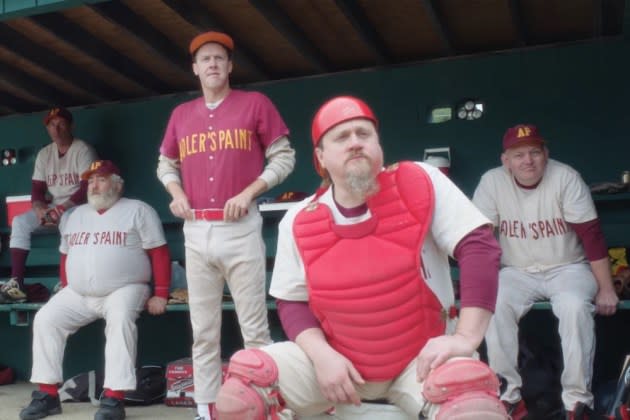‘Eephus’ Review: A Wry and Lovely Baseball Movie That Pitches Slowballs of Quiet Wisdom
- Oops!Something went wrong.Please try again later.
- Oops!Something went wrong.Please try again later.

Yogi Berra, perhaps the greatest catcher in history, is quoted in Carson Lund’s “Eephus,” a movie about players who, unlike Berra, are never going to trouble the Baseball Hall of Fame’s induction committee. To homage so lofty a legend in so humble a film is a pretty big swing. But one likes to think Berra would be tickled by the shout-out in this lovely little sundowner movie, during which a bunch of middle-aged casual players use the excuse of the last game of their season — and perhaps ever — to valiantly fight the dying of the light. After all, wasn’t he the guy who coined “The future ain’t what it used to be”?
The future sure looks different, suddenly, for the Adler’s Paint and Riverdogs adult-league teams who have played regularly at Soldier’s Field, the public pitch serving their small New England town, for years. This late October game will be the last they can hold here, as the grounds are due for imminent demolition. In another, more obvious movie, this would introduce a bad guy, some faceless corporation that wants to build luxury apartments or a big-box store on the site. But the rueful generosity of Lund and co-writers Michael Basta and Nate Fisher’s approach means that here, they’re not paving paradise to put up a parking lot. Instead, the pitch is being razed to build a school, something none of these midlife men can really complain about, even if some of them mutter mutinously under their breath.
More from Variety
Their future, it should also be pointed out, is our past: Lund sets the film in a throwback version of the ’90s where the players drive pickups and station wagons, and the signage is all hand-painted. One has a Plymouth with a push-button radio, on which hilarious spoofs of local advertising play, commercials where the business owner himself does the hard sell with all the flat, strained enthusiasm of the non-media-trained. Also on the radio: an announcer voiced by documentary maven Frederick Wiseman who, alongside Bill “Spaceman” Lee, the famous left-handed pitcher with the Red Sox in the ’70s, gives the film its two starriest cameos, in among a deep bench of indie character actors. Some faces might be vaguely familiar, but not so much it ever distracts from the choral chemistry within the ensemble.
Observed only by a smattering of family members, one ancient fan, an avid scorekeeper called Franny (Cliff Blake, perfectly channeling later-life Jack Lemmon) and a couple of teens deeply unimpressed by the league’s amateur status (“They’re just, like, plumbers and shit,”) one by one, the men step up to the plate. But we’re not here to watch the game any more than they’re really here to play it. The minimal action of “Eephus” is contained in the dugout chatter, the banter in the outfield, the beer cans multiplying in the grass, the bright sky slowly darkening, the tempers that get lost and found. Church bells chime and commuter trains shunt by, and as day turns to night, there are no narrative fireworks here. Even when there are literal fireworks, Greg Tango’s camera is pointed, with sweetly perverse affection, away from them, at the empty dugout as it’s briefly illuminated by the offscreen sparklers and rockets.
Very loosely, the cast is led by ornery pitcher Ed (Keith William Richards), who has to step up when the Adler’s Paint captain abruptly leaves for a christening, and his opposite number, Graham (Stephen Radochia), the Riverdogs coach whose endless prolonging of the game is especially pointed, as he’s involved in the Soldier’s Field demolition scheme. But “Eephus” (a term for an unexpectedly slow curveball with plenty of deceptive topspin so that, as one benched baseball-philosopher alleges, it seems like it’s hovering in midair) is not about rivalry nearly as much as it’s about companionship. It’s about using the Great American Pastime as a way to postpone the passage of time, and as an excuse for a togetherness these men clearly crave but that American masculinity discourages them from articulating in any other way.
Lund was DP on Directors’ Fortnight stablemate “Christmas Eve in Miller’s Point,” just as that film’s director, Tyler Taormina, appears here as producer. Together they and their Omnes Films shingle are softly spearheading an unassuming new nostalgia movement in American indie cinema, which is unashamedly sentimental without being soppy and deeply, almost surreally sincere in its observation of the arcane rituals that underlie so much of American social life. And here we have maybe the best expression yet of this New Suburban Quiet, even — and maybe especially — for those of us with little prior investment in the sport. Its pearls of practical wisdom and jewels of melancholic wit make “Eephus” a gem, which is fitting, for a movie about a game played on a diamond.
Best of Variety
Sign up for Variety’s Newsletter. For the latest news, follow us on Facebook, Twitter, and Instagram.
